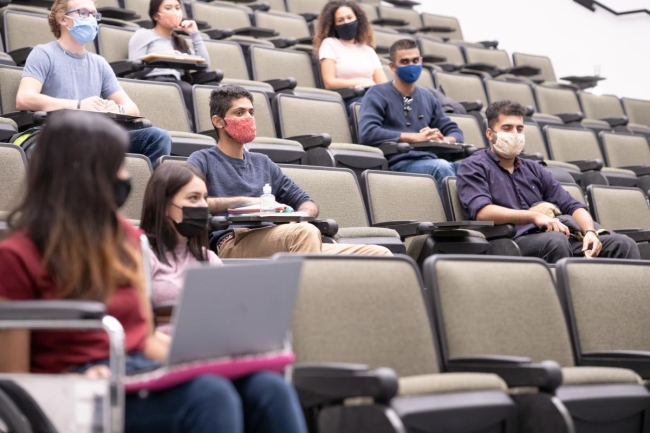You have /5 articles left.
Sign up for a free account or log in.

Mitigation strategies, such as requiring masks and vaccines, vary by campus.
Getty Images
Spiking COVID-19 cases have prompted some colleges to start the semester online and delay bringing students back to campus. Other colleges began the semester in person, then shifted to remote instruction. Still others are staying the course, remaining in physical classrooms despite the concerns of some students and faculty as coronavirus cases multiply.
Across the country, college COVID-19 dashboards are showing dramatic increases in case numbers, likely spurred by the highly transmissible Omicron variant. The University of Georgia logged 804 cases even before spring classes officially started. Arizona State University tallied 1,779 infected students and another 254 cases among faculty and staff. As of Jan. 11, the University of Texas at Austin listed 1,017 active cases—roughly one-seventh of the total number it has seen since March 2020.
At some institutions, in-person classes are moving ahead, even as governing boards limit the mitigation measures that can slow the spread of the coronavirus. For example, the University of Missouri welcomed students back to campus for the spring semester without a requirement for COVID-19 vaccines—which many colleges have—or a mask mandate.
The University of Missouri Board of Curators shot down vaccine requirements last year. A mask mandate established earlier in the pandemic expired in fall 2021, and the board voted this week to deny a temporary mask mandate that University of Missouri system president Mun Choi requested in a presentation Tuesday.
“The focus has always been, for us, on keeping our community safe, our students, faculty and staff, as well as our community members,” said Choi, noting disruptions to the system’s workforce prompted by surging coronavirus cases.
Moving Forward Without Masks
Per numbers updated Tuesday, the University of Missouri’s flagship campus in Columbia has 212 student cases of COVID-19.
University of Missouri spokesperson Christian Basi said by email that even though vaccines and masks are not mandatory, “we continue to encourage everyone on campus to mask when near others or indoors and to get vaccinated as well as a booster shot.”
Choi also mentioned the availability of vaccination clinics in his message to the board.
Experts note the efficacy of both vaccines and masks in preventing or slowing the spread of coronavirus.
“Vaccines and boosters are critical components in fighting the spread of COVID,” Gerri Taylor, co-chair of the American College Health Association’s COVID-19 task force, wrote in an email.
Well-fitting, high-quality and properly worn masks are another useful measure, she said.
Colleges without mandates should instead encourage students to get vaccinated and boosted as soon as possible, and to wear masks, she said. The greatest concerns are “for our high-risk students, faculty and staff (those either themselves or with family members) with chronic health conditions or who are immunocompromised, as well as those who are unimmunized or unboostered who can transmit COVID to those on campus,” she noted.
Additional mitigation strategies include “de-densifying campuses, physical distancing, hand washing, eliminating activities involving large crowds” as well as public health messaging with rewards and recognition for students who “do the right thing” regarding campus protocols.
Pushback to In-Person Classes
The University of Oregon, which also opened physical classrooms to students at the start of winter term, is now facing a formal labor complaint as COVID-19 cases spike across campus. The university reported 982 active COVID-19 cases last week as classes resumed.
The complaint, filed by the Graduate Teaching Fellows Federation with the state of Oregon’s Employment Relations Board, says the requirement to teach classes in person amounts to a change in teaching conditions, which must be negotiated.
GTFF filed the complaint in response to policies related to COVID-19 that require instructors—including graduate teaching fellows—to meet two conditions in order to move classes online. The first is the support of deans or department heads to shift to online courses, and the second is that classes must have COVID-19–related student absences of 20 percent or greater. Instructors teaching in person must also record classes for absent students.
“As the sole legal representative of our bargaining unit, the University of Oregon is required by law to consult with GTFF if changes to our working conditions are being made,” Mel Keller, president of the union, wrote in an email. “The way the Provost’s policy is written particularly forces instructors to record lectures and classes, and does not provide sufficient detail for [graduate employees] and faculty regarding possible exemptions and additional requirements.”
Keller added that “if we had been able to meet with the University in a formal bargaining process, we could have addressed some of these concerns outright” rather than filing a complaint.
While the complaint is “directed specifically at the lack of engagement from the University in the bargaining process,” Keller said, GTFF believes Oregon is creating an unsafe environment for instructors and students alike given the sudden surge of COVID-19 cases.
Ultimately, she said, the university would have been better off starting the semester online.
Molly Blancett, a university spokesperson, said via email, “Throughout the pandemic, the University of Oregon has followed public health guidance from the CDC, Oregon Health Authority, Oregon OSHA and Lane County Public Health. The provost sent a message Jan. 6 outlining the university’s plans to maintain academic continuity for winter term.”
Blancett also confirmed that the university is reviewing the complaint filed by GTFF.
Staying the Course
Dartmouth College has also seen a spike in coronavirus on campus as it resumes in-person classes, reporting 763 cases among students, faculty and staff in the last seven days. The college even offered students refunds should they wish to withdraw from classes given concerns around COVID-19, a deal that was available for the first week of classes.
But even as cases surge, Dartmouth is showing no signs of a pivot to remote instruction.
In an email to the campus community that went out Wednesday, college officials cited ongoing mitigation measures such as vaccine and mask requirements alongside “social distancing, ongoing surveillance testing, [and] isolation for people who test positive for the virus.”
The email, written by Interim Provost David Kotz and Executive Vice President Richard Mills, noted that the Dartmouth community has overwhelmingly complied with COVID-19 protocols. It also mentions the likely shift of the coronavirus from pandemic to a less severe endemic stage and touches on another concern for officials: growing mental health issues related to COVID-19.
“Young people are more intensely affected by the isolation, anxiety, and grief associated with the pandemic,” Kotz and Mills wrote. “Our decision to prioritize in-person classes, academic events, gym access, and restricted but congregate dining is directly connected to the imperative of preserving the mental and physical health of our students.”




